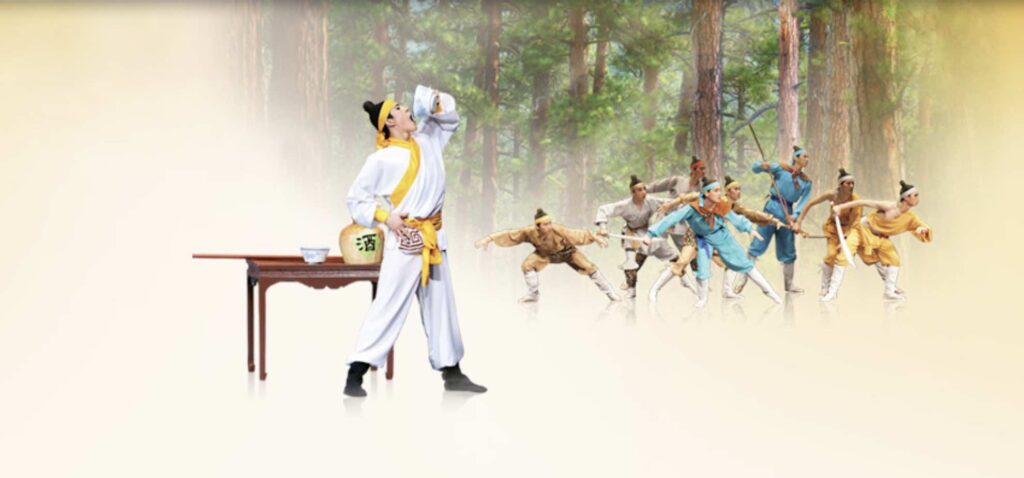Wu Song Beats the Tiger

Wu Song is a character from the classic Chinese novel Outlaws of the Marsh. The 14th of the 108 heroes of Mount Liang, he was known for extraordinary martial arts skills, and his capacity for liquor.
One day, while passing by a small village in Yanggu County, he saw a sign outside the local tavern: “Three bowls of our potent liquor, and you will not make it through the forest.” Wu Song was skeptical. He downed 15 bowls before heading for the woods. The bartender tried all he could to stop him, warning that a ferocious tiger was on the loose. But his entreaties were in vain.
Wu Song drunkenly stumbled on his way and went deep into forest. Tired, he took a break and lay down for a nap. No sooner had he fallen asleep than he was woken up by the roar of tiger upon him. That instantly sobered him. The fighting expert sprang up, pounced on the tiger, and killed it with his bare hands. News of his heroic feat spread, and Wu Song was given a high government post in Yanggu County.
Hearing the good news, Wu Song’s older brother moved to Yanggu with his new bride. He was a simple, kindhearted man who sold steamed buns on the street, but in appearance he was every inch Wu Song’s opposite—short, stocky, and well, ugly. His wife, however, was beautiful. Unfortunately, she was also a treacherous schemer—she committed adultery and then poisoned Wu Song’s poor brother. To avenge him, Wu Song killed the woman and her lover, placed their heads in front of his late brother’s altar, and then turned himself in to the authorities. But he was so popular with the locals that the court decided to spare his life and only exile him to a prison in Mengzhou County.
In prison, Wu Song lived an easy life with help from his new friend, the chief warden’s son, Shi En. Shi En happened to own a restaurant, which was forcibly taken by a ruffian renowned for his martial arts skills. To help his buddy out, Wu Song fought off the bully and reclaimed the restaurant. However, he had little time to savor his success.
Enraged by defeat, the thug conspired to frame Wu Song and have him exiled from Mengzhou with a pair of assassins. Luckily, Wu Song managed to kill his guards before they murdered him. A convicted criminal, Wu Song had no choice but to continue as a fugitive. On his travels, he met a sympathetic couple (though the wife had at first tried to turn Wu Song into stuffing meat). To hide him, they dressed him up as a monk, and Wu Song eventually made his way to Mount Liang.
There, he became one of the infantry leaders of the 108 outlaws. During the punitive exhibition led by Song Jiang to crush the rebellion of Fang La, Wu Song lost an arm in battle. And yet after their victory, Wu Song was one of the few survivors who declined the emperor’s invitation to return to the capital. It was a smart choice—the rest who accepted were tricked and killed. Wu Song converted to Buddhism at the Six Harmonies Temple, living a life of seclusion until his natural death at age 80.
Interestingly enough, Wu Song was an actual historical figure mentioned in many ancient records and local annals. A record from the Northern Song Dynasty recalled a story in which Wu Song killed a tyrannical government official to protect the populace.
Source: https://www.shenyunperformingarts.org/explore/view/article/e/1zXuXBhRyG4/wu-song-beats-the-tiger-outlaws-of-the-marsh-classic-chinese-literature.html
